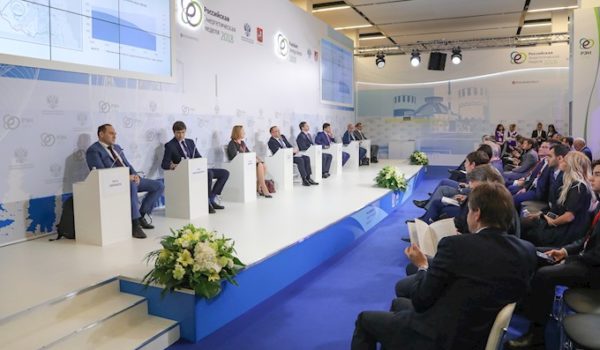Russian Energy Week participants discuss energy potential of Russia’s Arctic region

A panel session called ‘The Energy Potential of the Arctic: Implementing Projects and Developing Logistics’ was held as part of the Russian Energy Week (REW) International Forum on 4 October. The participants discussed the importance of the systematic development of the energy potential of Russia’s Arctic zone, plans to improve transport routes and logistics as well as measures to restore and protect the environment.
The discussion was attended by Russian Deputy Minister of Energy Pavel Sorokin, Director of the Oil and Gas Production and Transportation Department of the Russian Ministry of Energy Alexander Gladkov, Deputy Governor of the Yamalo-Nenets Autonomous District Alexander Kalinin, Deputy Governor of the Murmansk Region Yevgeny Nikora, Head of the Federal Sea and River Transport Agency’s Shipping Safety Department Denis Ushakov, and Yamal LNG Deputy Director for Marketing and Sea Transportation Kirill Bogdanovsky.
Sorokin stressed that Russia actively supports the development of opportunities in the Arctic region’s energy sector: “We are making great efforts to promote the investment appeal of the Russian Arctic. We are creating investment zones in which business is provided with serious support from the state, introducing tax preferences and preferential rates, and are seeing great interest in the region from potential investors. The Arctic has also become an example of how to create new infrastructure through public funding. For investors, this is also a key sign of the seriousness of Russia’s intentions to develop the region. Work is underway to update import substitution processes using the resources of the Arctic, and in the first half of 2019 the Ministry of Energy and the Ministry of Industry and Trade will present a jointly developed action plan to this effect”.
Sorokin also urged the participants to view the Northern Sea Route as a strategic breakthrough in terms of reducing the time required to transport energy resources from Asia to Europe by 30%. In addition, he said specialists from the Ministry of Energy have prepared information about plans for the additional exploration of energy resources in order to clarify the actual volume of oil and gas condensate reserves that need to be developed in the region.
Leaders from the regions of the Arctic zone presented strategic plans for attracting investment, developing the energy sector, and working with transportation and logistics issues. In particular, Kalinin noted that total investment in the Yamalo-Nenets Autonomous District has been around RUB 1 trillion annually since 2016. Operational indicators have been set at a high level. There are more than 60 major Russian and international energy companies working in the district, which is a positive indicator of international technological and business cooperation. Thanks to this work, Kalinin said Russia will manage to secure a stable leading position in the international LNG market by 2028 and LNG production will reach 60 million tonnes per year.
The regional leaders reported on their activities to support the Arctic environment. The session participants discussed the pace of expanding the ice fleet’s capabilities and new technologies for the production and transportation of energy resources in difficult climatic conditions.
All the aspects of the Arctic’s development that were discussed at the panel session ‘The Energy Potential of the Arctic: Implementing Projects and Developing Logistics’ will be presented at the 5th International Arctic Forum ‘The Arctic: Territory of Dialogue’, which will be held on 9-10 April 2019 in Arkhangelsk.

